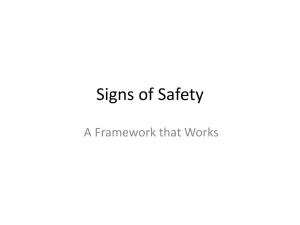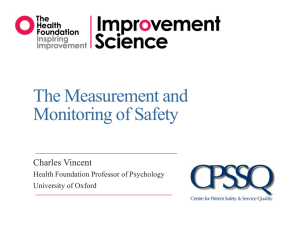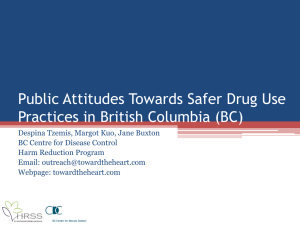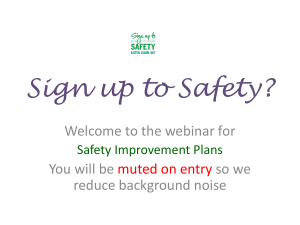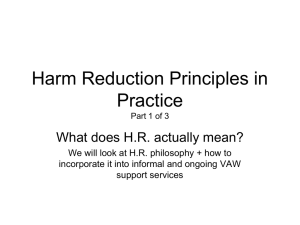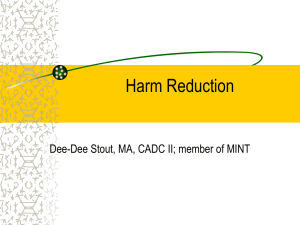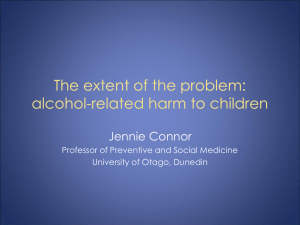Southern Adelaide Health Service
advertisement
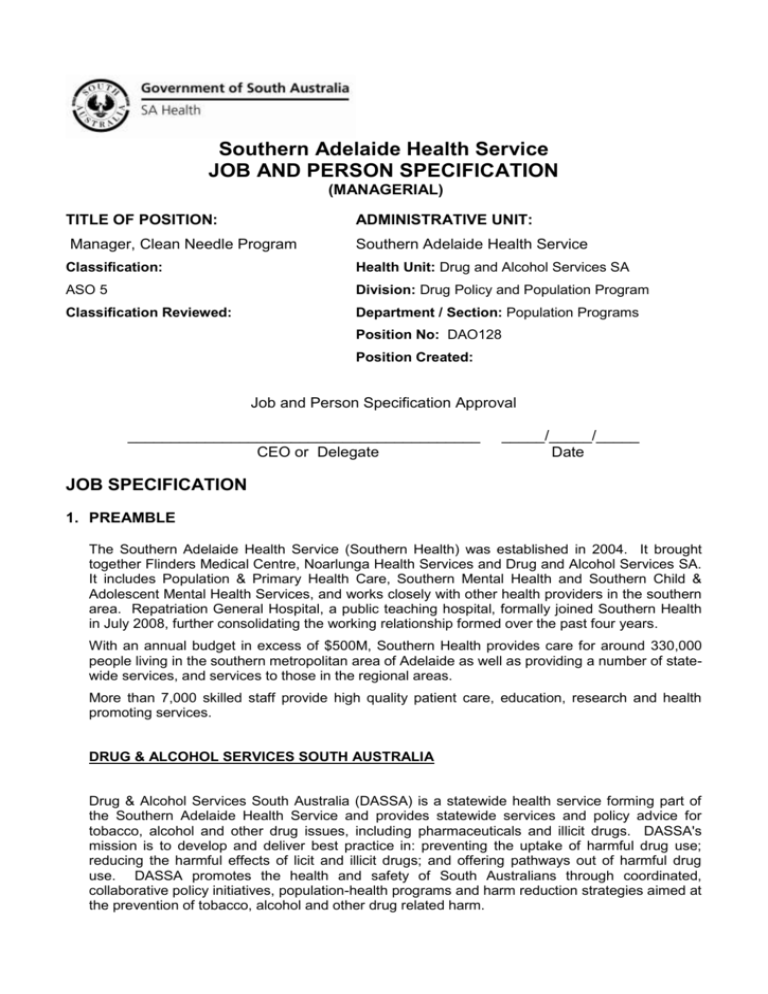
Southern Adelaide Health Service JOB AND PERSON SPECIFICATION (MANAGERIAL) TITLE OF POSITION: ADMINISTRATIVE UNIT: Manager, Clean Needle Program Southern Adelaide Health Service Classification: Health Unit: Drug and Alcohol Services SA ASO 5 Division: Drug Policy and Population Program Classification Reviewed: Department / Section: Population Programs Position No: DAO128 Position Created: Job and Person Specification Approval _________________________________________ CEO or Delegate _____/_____/_____ Date JOB SPECIFICATION 1. PREAMBLE The Southern Adelaide Health Service (Southern Health) was established in 2004. It brought together Flinders Medical Centre, Noarlunga Health Services and Drug and Alcohol Services SA. It includes Population & Primary Health Care, Southern Mental Health and Southern Child & Adolescent Mental Health Services, and works closely with other health providers in the southern area. Repatriation General Hospital, a public teaching hospital, formally joined Southern Health in July 2008, further consolidating the working relationship formed over the past four years. With an annual budget in excess of $500M, Southern Health provides care for around 330,000 people living in the southern metropolitan area of Adelaide as well as providing a number of statewide services, and services to those in the regional areas. More than 7,000 skilled staff provide high quality patient care, education, research and health promoting services. DRUG & ALCOHOL SERVICES SOUTH AUSTRALIA Drug & Alcohol Services South Australia (DASSA) is a statewide health service forming part of the Southern Adelaide Health Service and provides statewide services and policy advice for tobacco, alcohol and other drug issues, including pharmaceuticals and illicit drugs. DASSA's mission is to develop and deliver best practice in: preventing the uptake of harmful drug use; reducing the harmful effects of licit and illicit drugs; and offering pathways out of harmful drug use. DASSA promotes the health and safety of South Australians through coordinated, collaborative policy initiatives, population-health programs and harm reduction strategies aimed at the prevention of tobacco, alcohol and other drug related harm. The organisation also provides treatment and rehabilitation for people who have complex alcohol and other drug related problems; Services include telephone counselling, withdrawal management, a therapeutic community, pharmacotherapies, amphetamine treatment interventions, and statewide community-based counselling services. DASSA also plays a key role in monitoring, research and evaluation activities and contribute to the field of knowledge in relation to alcohol and other drug issues, providing evidence for the development of best practice standards, and innovation in clinical treatment approaches and primary prevention opportunities, together with workforce development strategies including training, research and teaching, and programs. In the interests of public safety, DASSA exercises controls over the use of drugs and poisons in South Australia through the implementation of the Controlled Substances Act 1984, and by providing expert and impartial advice to the Government concerning all aspects of pharmacy, therapeutic goods, poisons, and access to and use of medicines. DASSA provides policy and planning advice to the Department of Health and the Minister for Health, and coordinates, supports and provides expert advice to South Australia's role in national policy development and key multisectoral statewide policy initiatives and leadership to the South Australian Drug Strategy. 2. SUMMARY OF THE BROAD PURPOSE OF THE POSITION and its responsibilities/duties The position is responsible for the development, implementation and evaluation of strategic policies and programs to address harms related to injecting drug use across the State. The position provides expert advice and promotes the harm minimisation principles and practice to a variety of mainstream health, community and related agencies and targeted hidden population groups. The position is also responsible for providing information, training, consultation and support to state, local and non-government agencies as well as providing information, expert advice and assistance to targeted populations and the general community on drug harm reduction related issues. The position is responsible for pursuing and establishing partnerships within DASSA, the community, and government and non-government agencies in achieving program outcomes. The incumbent liaises, negotiates and develops collaborative working relationships with other Harm Reduction staff, Senior Management, Management and other Staff within DASSA, as well as with key external stakeholders including Commonwealth, State and Local Government, community and private sector organisations. The incumbent is also responsible for supervising the work of the Administrative Assistant, Clean Needle Program, ASO-3. 3. REPORTING/WORKING RELATIONSHIPS (to whom the person reports, staff for whom the person is responsible, and other significant connections and working relationships within the organisation) The incumbent reports to the Manager, Population Programs. The incumbent provides supervision to Administrative Assistant, Clean Needle Program, ASO-3. 4. SPECIAL CONDITIONS (such as non-metropolitan location, travel requirements, frequent overtime, etc) This is a temporary position until 30th June 2012. The position is based at DASSA Headquarters, located at 161 Greenhill Road, however, the incumbent must be willing to work in any area of DASSA, within the metropolitan area, should the need arise. Some out of hours work may be required Inter and intrastate travel may be required. Current drivers licence and willingness to drive is desirable. May be required to assist or be re-located to other areas within DASSA, should the need arise. May be required to undertake a health assessment prior to commencement. Appointment will be subject to a satisfactory Offender History Check. 5. STATEMENT OF KEY OUTCOMES AND ASSOCIATED ACTIVITIES (group in to major areas of responsibility / activity and list in descending order of importance). 5.1 Ensure effective management of the Clean Needle Program is maintained by: Establishing and maintaining the Clean Needle Program within community based services. Establishing data base collection systems, monitoring trends and undertaking research and evaluation in order to enhance management practices. Developing and providing recommendations for development and improvement of standards and networks. Ensuring ongoing contribution and improvements in the development of policy. Monitoring practices and procedures to ensure the program supports and is compliant with State and Federal Government policies. Undertaking delegated responsibility for the management and preparation of budget estimates associated with community initiatives, authorisation of expenditure and the monitor of cash flow. Providing general direction on the activities of the Administrative Assistant, Clean Needle Program. 5.2 Ensure the effective, efficient and coordinated planning and delivery of strategies to reduce drug related harm in the community by: Utilising a structured project management approach to project activities. Planning and prioritising project activities, setting and meeting project timelines and ensuring project deliverables are provided within both agreed timelines and budget. Incorporating best practise guidelines, performance indicators and monitoring and reporting compliance. Liaising and collaborating with a range of health and related agencies, including primary health care services, professional bodies and practitioners, government and non-government agencies to promote harm reduction and the implementation of harm reduction programs. Negotiating with key government and non-government agencies, community groups and the private sector to enter into partnerships to promote harm reduction. 5.3 Monitoring local needs, issues and trends and undertake planning to ensure a comprehensive and coordinated approach is taken to address the needs of the community through the development of harm reduction strategies to meet these needs. Ensure expert advice and consultancy is provided to DASSA, State and Local Government agencies, community organisations, private sector organisations and the community on drug harm reduction strategies by: Liaising and providing expert advice on behalf of DASSA to Senior Managers and Managers of State and Local Government organisations, community and private sector organisations. Providing expert advice and consultancy to Senior Managers and Managers of State and Local Government organisations, community and private sector organisations on how to develop and implement appropriate harm reduction strategies. Participating in the development of drug harm reduction policy. 5.4 Enhance the harm reduction knowledge of professionals, peers, students and community services workers by: Contributing to the development and delivery of specialised harm reduction training for selected professionals, primary health care workers, tertiary training institutions, professional organisations, and peer education networks, by utilising specialist knowledge and a range of strategies in conducting sessions. Providing information, education and training to existing and new Clean Needle Program site workers so as to expand their skills base in engaging with injecting drug users around harm reduction. Providing information, education and training to State and Local Government organisations, community and private sector organisations as required Providing information, education and training to existing and new Clean Needle Program site workers so as to expand their skills base in engaging with injecting drug users around harm reduction. 5.5 Identify, develop and facilitate, on a state-wide basis, opportunities to extend and expand Harm Reduction Programs, including the Clean Needle Program, into other government and community based organisations by liaising, networking and consulting with senior representatives of other Government, community and private sector agencies. 5.6 Ensure that appropriate monitoring and evaluation of the harm reduction strategies and projects is undertaken by utilising advice and expertise from Commonwealth and State experts, and management and clinical, research and other staff within DASSA. 5.7 Contribute to and comply with DASSA policy, directives and guidelines through: Assisting in policy development by drafting or providing expert advice on draft guidelines and procedures. Participating in quality assurance programs. Ensuring familiarity with and acting in accordance with DASSA and community services policies, procedures and guidelines. Utilising research data on current best practice in intervention, treatment, community development, prevention and health promotion and incorporating findings into daily practice. Contributing to / participating in DASSA approved research / evaluation projects. Providing assistance with other projects or programs aimed at attaining DASSA corporate goals and objectives. 5.8 Contribute to the promotion and implementation of General Public Sector Management aims, personnel management standards, employee conduct standards, the Equal Employment Opportunities, Occupational Health and Safety and Welfare Acts, by adhering to the provision of relevant legislative requirements and Southern Adelaide Health Service and DASSA policies and procedures eg OH&S, Quality etc. Adherence to your role (s) and responsibilities in accordance to Southern Adelaide Health Service and DASSA, Policies and Procedures. Acknowledged by Occupant:______________________________ Date:_____/_____/_____ PERSON SPECIFICATION 1. ESSENTIAL MINIMUM REQUIREMENTS (those characteristics considered absolutely necessary) Educational/Vocational Qualifications Personal Abilities/Aptitudes/Skills The successful applicant must have demonstrated and proven ability to: Develop written correspondence including reports. Initiate, plan and manage complex projects. Think creatively, identify and apply alternative solutions to problems, independently and ingroups. Analytical ability, ability to conceptualise and to devise innovative, practical solutions to complex issues. Plan, influence and implement change. Communicate, consult and negotiate effectively, both verbally and in writing, with individuals from a diverse range of backgrounds. Resolve conflict, solve problems and conduct difficult negotiations. Manage staff. Experience The successful applicant must have demonstrated to a high level, proven experience and successful performance in the following areas: Health industry and in particular direct involvement with the development and implementation of early intervention programs. Planning, coordinating and managing projects, consultancies and programs. Negotiating and liaising with a variety of people, including senior and professional staff, community organisations and members of the community. Managing a budget and/or program management. Work with limited supervision, to plan and organise workload, determine priorities and produce work within tight deadlines. Development and implementation of policy. Statistical data analysis and computer application of records and data bases. Personnel and other resource management. Knowledge A knowledge of the drug treatment philosophies and networks together with current strategies for harm reduction programs amongst injecting drug users. A sound knowledge of computerised data collection systems. Knowledge of research and evaluation techniques. A sound knowledge of project management. 2. DESIRABLE CHARACTERISTICS (to distinguish between applicants who meet all essential requirements) Personal Abilities/Aptitudes/Skills Ability to work effectively in a highly controversial area. Demonstrated initiative and innovation in undertaking and evaluating projects. Experience Experience in drug harm reduction including prevention and management of blood borne diseases in injecting drug users. Working with injecting drug users. Previous experience in providing direction and training of staff. Knowledge Awareness of the aims and objectives of the Drug and Alcohol Services South Australia. Working knowledge of public health principles or alcohol and other drug work. Occupational Health and Safety practices and procedures. Educational/Vocational Qualifications (considered useful in carrying out the responsibilities of the position) An appropriate tertiary qualification in a related field. Other details INFORMATION FOR APPLICANTS INTRODUCTION Thank you for considering applying for a position with the Southern Adelaide Health Service (Southern Health). Recruitment and Selection processes at Southern Health reflect best practice and a commitment to a selection based on merit. This means treating all applications in a fair and equitable manner that aims to choose the best person for the position. The following information is provided to assist you when applying for a position with Southern Health. HOW TO MAKE THE BEST IMPRESSION A well presented, easy to read application will allow the panel to assess the information they need from your application. To give yourself the best opportunity to reach interview, the application should clearly and concisely demonstrate to the selection panel that you are suitably equipped to perform the role, and that you possess all of the stated minimum essential skills, abilities, knowledge, experience and educational qualifications (where required). We suggest the following format: A covering letter of up to 2 pages introducing yourself to the selection panel and describing your skills, abilities, knowledge, qualifications and experience in relation to the position. The covering letter should clearly state the job vacancy number, position title, your name and your contact details; Curriculum vitae that includes your personal details, relevant employment history, education, training courses, qualifications and professional memberships. Your CV should also include your nominated referees, their position and their contact details. THE JOB AND PERSON SPECIFICATION Selection for interview will be based on an assessment of your application against the requirements of the position as outlined in the Job Specification, and against the criterion detailed in the accompanying Person Specification. It is recommended that you carefully read the Job and Person Specification to understand what the position entails before proceeding to apply for the position, and ensure that your written application reflects your suitability for the position. Note for Nursing/Midwifery applicants: Applicants applying for positions at the Clinical Nurse (level 2) classification are required to demonstrate by way of example/evidence that each of the criteria contained in the statement of key outcomes and activities of the Job Specification are met in their application. Please ensure that your written application includes sufficient information for the panel to make an informed determination. REFEREES It is recommended that you advise your referees of the position you are applying for as the panel may seek their opinion of your capability to perform the requirements of the position. At least one referee should be your immediate supervisor/manager in your current position, able to provide current feedback about you to the selection panel. PRE-EMPLOYMENT DECLARATION (PED) Please ensure that you complete and submit this from with your application. SUBMISSION OF APPLICATIONS It is generally preferable that applications are not bound or in folders, and that the requested number of applications be provided when posting. Please ensure that applications are addressed as indicated in the job advertisement, and that you allow sufficient time for your application to reach us by the closing date/time specified. Late applications may not be considered. We take this opportunity to wish you success with your application!
